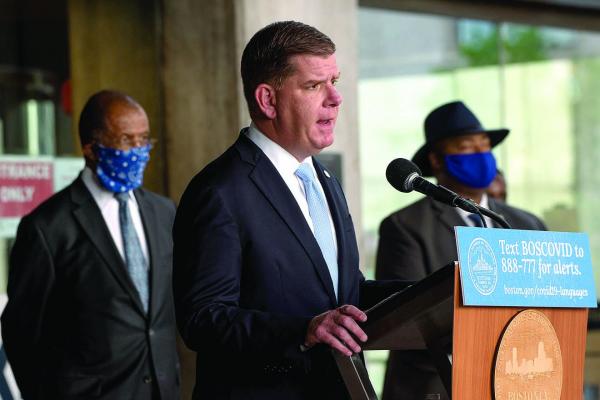June 17, 2020

Mayor Martin Walsh was joined by former US Associate Attorney General Wayne Budd at a press conference at Boston City Hall to discuss COVID-19 as well as declaring racism a Public Health Emergency in Boston. Mayor’s Office Photo by Jeremiah Robinson
Declaring racism a public health emergency in the city of Boston, Mayor Martin Walsh last Friday signed an executive order outlining the transfer of $3 million from Boston Police overtime budget to the Boston Public Health Commission (BPHC). He said that he will also propose budget changes reallocating an additional $12 million from the police overtime budget to various city departments.
“In Boston, we embrace the opportunity this moment and this movement offers us. We stand with our black community and communities of color to lead the change toward a more just and equitable society,” Walsh said outside City Hall. “With these actions we will increase equity in public safety and public health, and launch a conversation that can produce lasting, systemic change to eliminate all the ways that racism and inequality harm our residents.”
The BPHC is expected to release a detailed action plan within 120 days; it will also, starting next year, produce an annual progress report measuring any challenges in addressing systemic barriers to equity goals.
“Racism is a driving force that shapes access to the social determinants of health and is a barrier to health equity for all Bostonians,” said Marty Martinez, Chief of Health and Human Services. “This declaration will bring this work into greater focus with real, intentional efforts to get to the root causes and see measurable solutions.”
The mayor also announced the creation of a new task force led by community members and chaired by former US Attorney for the District of Massachusetts Wayne Budd.
“I, along with the members of the Task Force, recognize the importance of the responsibility the mayor has asked us to undertake. This comes at a very difficult time in our country, which makes the work that we are about to undertake even more important,” said Budd. “You can be assured that we will give the task at hand the first attention and our best efforts, all to the end of assuring the very best the Boston Police Department has to offer and its responsibility of protecting and serving all people of Boston.”
The task force is charged with reviewing the police department’s use of force policies, recommending rigorous implicit bias training for police officers, improving the current Body Worn Camera program, and strengthening the police review board, known as the Community Ombudsman Oversight Panel, or Co-op Board. The group is expected to present within 60 days.
Police Commissioner William Gross said that the department would not be “defensive” or “adversarial” to change and reform. “We do want different eyes on our policies and procedures and we do want to move forward. That means working in partnership with the community to solve problems and create a better quality of life for all,” he said. “That’s exactly what we’re talking about today. The Boston Police is not going to be defensive and adversarial… the people that we serve should have the expectation that this department will improve each and every year.”
Back in March, District 5 City Councillor Ricardo Arroyo had called for a public health emergency caused by racism to be declared. After the mayor’s announcement, some of Arroyo’s colleagues on the council and residents pointed this out.
At-Large Councillor Michelle Wu wrote on Twitter: “Boston’s public conversation already included fierce advocacy to declare racism a public health crisis 3+ months ago – thanks to @RicardoNArroyo filing this for his first speech from the Council floor.” Arroyo retweeted a separate tweet noting his previous proposal, writing: “Racism has a long history of erasure.”


